Meandering Em's
Passion is books, photography, running and traveling. Also passionate about environmental issues.
I agree with the sentiments

I am currently having problems with my lawyer who thinks he is so superior to me and my family that he doesn't have to answer emails or respond to requests. I am waiting eagerly for the next bill which I will pay in proportion to his responses.
I was delighted to see this book donated to a book sale today. I snatched it up and quickly read it through. It is full of quotes about lawyers and their dirty deeds. Not everything was applicable to my case, but there was enough to make me roar with approval. This quote by a lawyer is true: "A well-known occupational hazard of lawyers is their tendency to become contentious, and to develop such associated traits as being arrogant, deceitful, and punitive."
I am keeping this book close by in case I have to communicate with my lawyer. Hopefully it will provide me with a few choice words.
Unlikeable Protagonist

I received this book in a Goodreads Giveaway.
I enjoyed the book. It was a quick read and hard to put down. However, I did not care for the protagonist. She was a tough woman who was hard to relate to. She killed without qualms or remorse. Near the end of the book, I began to detest her because she didn't know when to stop punishing someone. She deliberately ransacked a house and I saw no reason for this vindictiveness.
I did not care for the constant crude language of the characters and the neglect that Kay Hamilton showed her daughter.
I doubt if I would read another book in this series. I deducted one star for the unlikeable protagonist and 1/2 star for the unnecessary foul language, leaving a rating of 3 1/2 stars (Booklikes.)
Lovely Reread
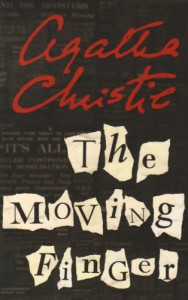
This is listed as a Ms. Marple story, but she plays a minimal role and doesn't even appear until the last 30 pages.
I really enjoyed the narrator, Jerry Burton. He was wounded during World War II and is recovering. His doctor told him to go rest in a quiet English village where little happens. The village that Jerry and his sister decide to live in is not a quiet village. Instead, there are a series of poison pen letter being sent to various citizens. This is followed up by a suicide and then a murder.
While all these mysterious events are taking place, Jerry falls in love and then has to wonder if his new love might be the letter writer. The love interest is sweet and innocent.
I enjoyed the book immensely. I was sure of the murderer all the way through the book, but I was wrong. Great job, Agatha!
Another Agatha Mystery

Another enjoyable reread. I remembered who the murderer was when one of the secondary characters was killed. However, I did not remember the entire plot or the reason for the murder. It is a good thing that Miss Marple was nosy and went to the scene of the crimes. I'm not sure the detective would have figured it out without her.
In Many Ways, Maddening

This is rated 3 1/2 stars. The introduction to my edition says that this was Hardy's first masterpiece. That might explain the lengthy and occasionally tedious descriptions that the reader has to wade through.
Bathsheba is presented as a strong-willed, beautiful, hard-working, independent and intelligent woman. In reality, she is beautiful, but that is about it. She is so strong-willed that she can't tell Boldwood she doesn't want to marry him. She is seldom seen in the fields working. She marries the first pretty male face with a muscular body that shows up and becomes subservient to him. This shows she is neither intelligent or independent.
The hero of the story is the the stabilizing and stalwart Gabriel Oak who remains steadfast in his love for Bathsheba, yet keeps his integrity. Despite other readers' opinions, I found Gabriel the kind of man that makes a good husband and father. I'm glad he finally gets his heart's desire at the end of the book. I hope he never regretted that decision.
Not a good imitation of Agatha Christie

I received this at the Malice Domestic celebration of Agatha Christie. I have to admit the plot was good (although preposterous) and the book relatively readable. I probably would have given a higher rating IF the main detective were not Hercule Poirot.
If you are expecting a true Agatha Christie tale, you will be disappointed. The main reason is that Ms. Christie did not write long and wordy novels. Her style is short and succinct. Her books are seldom boring nor does she have long sections of tedium. This book is too long, too wordy and just makes me want to read a REAL Agatha Christie book, which I am doing. The first few chapters just DRAGGED. After that the story did pick up. The narrator of the story is supposed to be policeman from Scotland Yard, but he certainly isn't the brightest bulb on the tree. He is much less imaginative than Hastings who I always enjoyed. This policeman did not have a pleasing personality at all.
Would I read another book by Ms. Hannah? Probably, but only if I got it free or from the library.
Still Relevant After All These Years

Each time I read this book, I am amazed at how marvelous it is. Harper Lee portrays the residents of a little town in Alabama with such accuracy that I can see each person clearly in my mind. I can see Atticus, a strong, brave, quiet man who always tries to do right, regardless of the consequences. He values all human life, regardless of skin color. Others in the town might agree with him, but are afraid to voice their opinions, some through fear and others through financial concerns. We see the stratified classes of the whites through the opinions of the narrator's aunt. We see the hypocrisy of the leading church members, who are busy donating money to convert the Africans, while ignoring and denigrating the black population in their own backyards. Harper Lee shows us all sorts of people with love and compassion, ranging from the mentally disturbed to the angry outcast. She reveals the flaws in the justice system of the South in the 1930's, where no black man would be believed if a white man or woman accused him of rape, murder, or any other crime.
Not much has changed in our country. As soon as I finished reading this book, I saw a 48 Hours presentation of a black man who has been imprisoned for more than 25 years, convicted, not based on evidence, but based on the words of a white woman and shenanigans of a corrupt police and justice system in Florida.
Definitely a Fantasy Tale.

I won this book at the 2015 Malice Domestic conference this month. I met briefly with the author and spoke with her as she signed my book.
The book was well-written; however, it is not the type of book that I enjoy. The main character, Grace Wilde, communicates with animals and understands what they feel and see. This is how she discovers that a teenage girl, Brooke, who is missing was actually kidnapped. I don't really think that this kind of ability exists, but I was willing to suspend my beliefs and go with the flow. However, I think this 'ability' was used too often to discover clues and to move the plot along. Much of the story was so improbable and tiresome that I couldn't wait to finish the book. Then the ending was much too violent for a cozy. I read cozies in order to avoid the excessive violence in many books today.
I did enjoy the slow progress of Grace and Kai's relationship. That is more realistic than much of the other events. However, I don't think I will continue with the series to see how their relationship evolves.
The Good, the Bad and the Improbable

By complete coincidence, I started reading two books at the same time and both featured recluses. Isn't that weird? I began this book and To Kill a Mockingbird at the same time.
In this case, the recluse was an elderly woman who was related to Meg's paternal grandmother, who was recently killed. Of course, Meg and her family need to find out more. Luckily for them, the deceased grandmother was involved in saving feral emus, so Meg's grandfather was able to figure out a way to capture the emus and have Meg investigate the murder at the same time. Sound far-fetched? That is only the beginning.
As usual, the plot borders on the absurd, but the down-to-earth Meg manages to make the story plausible. I was glad that Meg's mother only appeared briefly, since she is one member of the family I can barely tolerate. Even though Meg is a mother to two small children, they never interfere with her investigations. That does not seem realistic to me at all. In fact, there were a few incidents that were so unsettling and improbable that I got distracted from the story. Those items include a partial plate laying around for 30 years and a totally unrealistic fight scene. For these reasons, I only gave the book 4 stars.
I recently met Donna Andrews at Malice Domestic and she signed my book. However, that exciting event did not affect my review in any way!
 6
6
 1
1
Bleak House Leads to Bleak Read
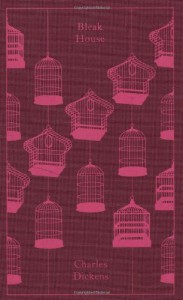
I am not a Dickens fan and this book is a prime example of why. It is long and wordy and really needed an editor. Yes, I know he got paid by the word, but so did other authors, like Trollope, Gaskell and Collins: however, their books are readable and enjoyable.
I have tried to read this book in the past and never succeeded. However, this time I finished although it took more than 130 days or 4 1/2 months.
The basic idea behind the book is how a defective court system destroyed people's lives. Unfortunately, Dickens gives so many examples that the reader gets inundated and doesn't really care who lives or dies by the end of the saga. His book is almost as long as the court case.
There were less caricature figures in this book and for that I rejoiced. Dickens actually portrayed the Bagnet family in a humorous and realistic way. They were the highlight of the book and I wish more time had been spent in writing about this family.
The first half of the book (about 500 pages!) really dragged. More and more characters were added until the reader needed a list of who's who. Fortunately, the second half of the book flowed more quickly. It is for this reason that I gave it 2 1/2 stars.
Miss Marple on the Move
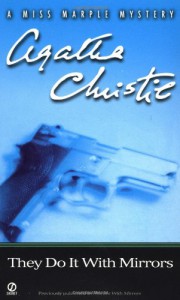
Miss Marple goes to visit a very old friend and finds herself in the middle of a murder. I was pretty sure who committed the murder and how, but I could not determine the reason for it. As usual, it is a convoluted plot with strong characters and a slight love story with a happy ending (two main characters leave dreary England and move to America!
The Jungle
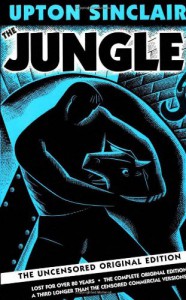
This book would have been a 5 star read, but, alas, the last 10% of the book turned into a lecture about the utopian world as visualized by a Socialist.
I found the book fascinating in a macabre way as the author explores the world of the immigrant worker in America. The working conditions of our ancestors should not be viewed through the shiny lenses of the "good old days." Farmers had it tough, but the working conditions of the mines and factories was horrific. Although it is hard to believe that one man could suffer all the horrible things our hero suffered, the depictions are probably more accurate than we want to believe. The working conditions of the meat plant were revolting. The food contamination worse. The corruption of politicians...hasn't changed. The tricking of foreigners...hasn't changed. The sexual abuse of women...hasn't changed. However, working conditions have changed, at least for now. This book is MUST reading for all those people who believe that corporations can regulate themselves. Many babble about how deregulation is good for our country. As long as making money is the main goal of a business, there is little or no incentive to care about workers.
The last part of the book I found boring. I see the appeal for socialism during that time period, but to lecture the reader about the philosophy ruined the ending.
The author wrote this book to show the horrible working and living conditions of immigrants and how they were tricked and defrauded by almost everyone around them, including politicians and business owners. He hoped to improve the lot of the working family. There were changes after its publication, but not because there was sympathy for the working class. People were horrified about the filth in the meat packing industry and how their food was contaminated. Changes were made because society is basically selfish. This was the analysis of Sinclair himself who admitted his celebrity arose "not because the public cared anything about the workers, but simply because the public did not want to eat tubercular beef."
Quite a boring read

I found the writing to be laborious. There were few clues as to who was speaking or who was thinking what. I hate this type of arrogant writer. What is the point? Was Nadine Gordimer trying to get us to sympathize with the plight of South Africans? If so, she failed miserably. I did not care for any white or black person in the story. I just wanted the book to end.
If you really want to read about the conditions of South Africa before Apartheid made them worse, then read Cry, the Beloved Country by Alan Paton.
How is the death "beautiful blue?"
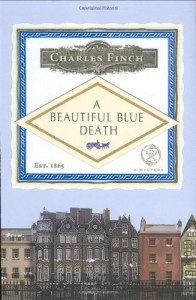
This is the first book in the series of Charles Lenox, a Victorian aristocratic detective. It certainly wasn't as well written as the later books in the series. I found several typos and one major gaffe in the book. In Chapter 31, Charles and his lady friend, Jane, are preparing for a banquet and dance. Lady Jane is helping Charles with the final touches of his dress at "just past six." After they converse, it was "nearly six." I guess Mr. Finch did not have a great proofreader for this addition of the book.
Lady Jane asks Charles Lenox, the detective (not Charles Finch, the author) to investigate the death of her former servant girl. Scotland Yard proclaims it is a suicide, but Jane is not sure. Charles finds that the servant girl was actually poisoned with a rare and expensive poison. Why was this servant killed? To find the answer, Charles visits Parliament as well as lowly and poor sections of London. He is attacked near his home. Finally, his prime suspect is stabbed and killed at the banquet. Only then, does Charles piece together the rhyme and reason for the two murders.
Even though I enjoyed much of the story, there were several improbable events. One of the prime clues was a small raw burn mark seen on a suspect's arm. However, how this small mark could be seen on a dark evening while across the street is far-fetched and unbelievable. Even the explanation of how this burn occurred did not make sense. I am glad that I have read other books in the series first. Otherwise, I might have not read any other books by Mr. Finch.
Mystery in China

Inspector Chen is a chief inspector in Shanghai who has been given a week's vacation in Wuxi, a neighboring city. He is a rising star in the Chinese government although he has ruffled feathers with Internal Security. He meets a young woman, Shanshan, and hears about a murder on his first day of vacation. These two events become related when Chen discovers that the girl and her former boyfriend are under suspicion for the murder. Why are these two suspected?
China has a terrible pollution problem which the government is ignoring in order to maintain economic growth. Their waterways are so polluted that the citizens can't even touch the water. Pure drinking water is scarce and all the fish eaten are full of contaminants. All this can be verified with doing only a limited search on Bing.
The author has taken this serious environmental issue in China and made it a crucial part of the mystery. The girl and her friend are trying to get companies and corporations to stop polluting. The leaders of these companies ignore the issue because they know their profits will decline if any safeguards are implemented. The Chinese government gives lip service to environmental issues, but they reward economic growth. So what would a greedy industrialist do? Look at America and you know.
When a leading business is killed, the government thinks this would be an excellent time to "solve" a murder and get rid of a perceived threat. The officials from Internal Security pin the murder on Jiang, Shanshan's friend. Detective Chen has to find a way to solve the murder while in an unofficial role.
Even though the environmental problems in the USA are no longer as terrible as they were in the 1960's, the environmental progress has slowed and is actually in decline. The reason is that the Republican party, who gets much of their wealth from corporations, want no regulations. To them, money is more important than the health of their citizens. Neither China or the US look at the true cost of environmental degradation, including medical costs associated with pollution, fracking, etc. While reading this book, I realized that there is very little difference between the objectives of the Chinese or American governments. The citizens of each country have little say compared to business and corporations.
This was a fantastic book written by a Chinese national who currently lives in the United States. The author is a poet and this book in interspersed with his poetry about the destruction of Tai Lake in Wuxi, China.

The plague has arrived in Oran, Algeria. As each day passes, the townspeople endure horror after horror. Unable to leave the city, they are separated from loved ones who had left before the quarantine or who have died. Food becomes scarce even though the rich, as always, have enough. Month after month, Oran is separated from the world as some citizens die and the rest wonder when their death will come.
Camus portrays the different stages that people go through in time of crises. First there are complaints that the government isn't doing enough and then complaints that the government has gone to far. In the beginning, there is optimism that the plague will end soon, but after months with no respite, hope fades and lethargy and resignation take over.
I understand that Camus wrote absurdest literature. I'm am not sure what that is. I do know that Camus did not believe in God and this book resonates with the hopelessness of a world without God. Several men are searching for the meaning of life, but can't find the meaning because they left out the Creator. One man says, "what interests me is learning how to become a saint." His friend replies, "But you don't believe in God." The first man says, "Exactly! Can one be a saint without God?---that's the problem, in fact the only problem, I'm up against today."
Albert Camus was awarded the Nobel Prize for Literature in 1957. His writing is crisp and introspective. The book is worth reading just for the psychological processes that a group of people experience during the time of tragedy. It also helps understand a little bit of what West Africa is experiencing with Ebola.

 1
1






